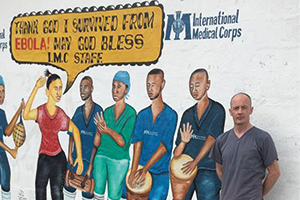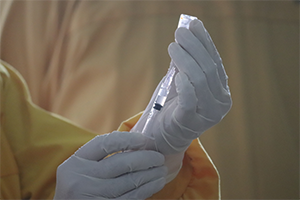Biology is a constant struggle between pathogens that seek to exploit the resources of their hosts, and host immune systems that seek to prevent this. Over 80 leading scientists in the Infection and Immunity Research Theme study multiple facets of infection and immunity, ranging from the functions of individual host or pathogen proteins, and of specific immune cells in the body, through to population-scale studies of infectious disease spread. This research contributes to some of the biggest questions we face in the 21st century: Can we prevent the next pandemic before it occurs? Can malaria and tuberculosis be consigned to the history books? How can we harness the immune system to fight diseases like cancer? Research by Infection and Immunity Theme members will provide fundamental insights into immune system function and the biology of pathogens, underpinning the development of new therapies to improve human and animal health, and helping safeguard the crops on which we depend.
Current areas of focus include: Understanding the Immune System to Treat Disease; Changing Pathogens in a Changing World; The molecular interface between pathogens and hosts.
Impact Case Studies
 |
Fighting Ebola in Sierra LeoneEbola virus is one of the deadliest pathogens known to humans. It causes Ebola haemorrhagic fever which is fatal in 50% of cases. It can be transmitted between humans or from animals to humans. Ian Goodfellow led an international team that established an ‘in field’ lab for rapid Ebola diagnosis and the first genetic sequencing facility in Sierra Leone. This effort processed >25,000 samples in the field, reduced diagnosis time from 7 days to 4–6 hours and directly informed the World health Organization (WHO) response strategy. As a direct result, the spread of Ebola was tracked and minimised, allowing containment of disease sources, ultimately ending the epidemic. Read |
 |
Shaping WHO meningitis guidelinesMeningitis is a serious infection that causes swelling of the meninges, the membranes surrounding the brain and spinal cord. Caroline Trotter was engaged by the World Health Organization (WHO) as a trusted advisor to help tackle the challenge of meningitis on the African continent. Epidemiological modelling of vaccine strategies using MenAfriVac® to control bacterial meningitis group A, widely found in sub-Saharan Africa, was undertaken at the University of Cambridge. Trotter’s contributions led to the successful introduction of the vaccine into routine immunisation schedules, supported by a ‘catch-up’ campaign. Read |
